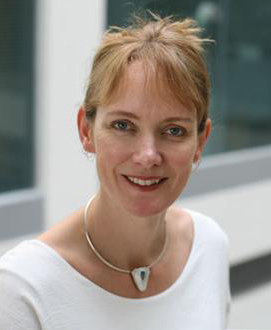Francesca Happé facts for kids
Quick facts for kids
Francesca Happé
|
|
|---|---|

Francesca Happé
|
|
| Born |
Francesca Gabrielle Elizabeth Happé
1967 (age 58–59) Cambridge, England, UK
|
| Nationality | British |
| Alma mater |
|
| Known for | Research on autism spectrum conditions |
| Awards | Rosalind Franklin Award (2011) |
| Scientific career | |
| Fields |
|
| Institutions | King's College London |
| Thesis | Theory of Mind and Communication in Autism (1991) |
| Doctoral advisor | Uta Frith |
| Doctoral students | Essi Viding |
Francesca Happé, born in 1967, is a British scientist who studies the brain. She is a Professor of Cognitive Neuroscience. This means she studies how our brains help us think and understand. She also leads a special center at King's College London. Her main work is about autism spectrum conditions. She helps us understand how people with autism think about social situations.
Contents
Early Life and Learning
Francesca Happé grew up in a family that loved science. Her grandfather was a scientist who created new things. Her parents always told her to ask questions. This helped her become curious about the world.
Studying Psychology
In the mid-1980s, Happé studied Experimental Psychology at Corpus Christi College, Oxford. She learned a lot about how people think and behave. Lectures about autism really caught her interest.
During a summer break, she joined a research project. This project was about autism and was led by Neil O'Connor and Beate Hermelin. This experience made her want to learn even more about autism.
Starting Her Research Career
Happé planned to get her PhD at Oxford. However, she was told to meet with a famous scientist named Uta Frith. This meeting changed her path. She decided to study for her PhD at University College London. Her research focused on autism, and Uta Frith was her supervisor.
Her Work and Discoveries
From 1991 to 1995, Happé worked at a research unit. Then, she spent a year in the USA. Since 1995, she has worked at the MRC Social, Genetic and Developmental Psychiatry Centre. She started as a Senior Scientist and became a Professor in 2008. In 2012, she became the Director of this important center.
Understanding Autism
Her work explores how autistic people understand the world around them. She has made two big discoveries. First, she found that autistic people often pay more attention to small details. Their family members might also share this trait.
Second, she discovered that autism can be experienced differently by women and men. She also studies the mental health of autistic people. She looks at how aging might affect them too.
How She Does Research
Happé uses many different ways to study autism. She has studied twins to see how genetics play a role. She also looks at how strokes can affect the brain. She uses special brain imaging methods. These methods show how the brain works. She also uses traditional psychology methods.
Her research has received funding from important groups. These include the Wellcome Trust and the MRC.
Leadership and Contributions
Happé has been a leader in the field of autism research. She was the President of the International Society for Autism Research from 2013 to 2015. She also served on its Board.
She has been part of the National Autistic Society's advisory group since 2011. This group helps with issues related to autism in adults. She has also helped edit important scientific journals.
In 2021, Happé received a special honor. She was appointed Commander of the Order of the British Empire (CBE). This award was given for her great work in studying autism.
Awards and Recognitions
Francesca Happé has received many awards for her important work:
- Scholarship, Corpus Christi College, Oxford (1987)
- Proxima Accessit to the Chris Welch Science Scholarship (1988)
- Young Science Writer prize (1991) from The Daily Telegraph
- British Psychological Society Spearman Medal (1998)
- Experimental Psychology Society Prize (1999)
- Royal Institution Scientists for the New Century Lecturer (1999)
- Winner, King's College London Supervisory Excellence Award (2011)
- Rosalind Franklin Award (2011) from the Royal Society
- Elected a Fellow of the British Academy (2014)
- Elected Fellow of the Academy of Medical Sciences (FMedSci) (2017)
She was featured in a Channel 4 TV show called A Living Mind. This show was part of the Living Science series. It was made for students aged 11 to 14. She was also a guest on The Life Scientific on BBC Radio 4 in September 2020.

